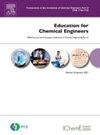通过使用多媒体支持的翻转课堂方法,检查学生对有机化学的参与和动机
IF 2.3
2区 教育学
Q1 EDUCATION, SCIENTIFIC DISCIPLINES
引用次数: 0
摘要
有机化学教育的有效转型需要采用创新的教学方法,在整个学习过程中积极促进学生的参与和动机。因此,本研究调查了多媒体支持的翻转课堂方法(MSFCA)对卢旺达中学学生学习有机化学的参与度和动机的影响。本研究采用解释序贯研究设计,研究对象为73名高中五年级学生和2名化学教师。定量数据使用李克特量表问卷收集,并使用社会科学统计软件包(SPSS)进行分析,而结构化访谈的定性数据则进行主题分析。调查结果显示,通过MSFCA,学生的参与度和学习动机都很高,他们的积极调查反应证明了这一点。此外,当使用这种创新的方法教学时,定性的见解突出了学生对有机化学的渴望。然而,与城市学生相比,农村学生的动力水平较低,主要原因是信息和通信技术(ICT)基础设施面临挑战,例如互联网接入有限和计算机不足。平均分数的统计显著差异(农村:49.58,城市:68.47,P <; 0.001,df =72)强调了农村地区有限的资源如何阻碍了多媒体支持的翻转课堂的有效参与。基于这些发现,本研究建议更广泛地整合MSFCA,以提高学生对有机化学的兴趣和动机。它还强调需要扩大信息通信技术资源,包括可靠的互联网连接和充足的计算机可用性,特别是在农村学校。本文章由计算机程序翻译,如有差异,请以英文原文为准。
Examining students’ engagement and motivation in organic chemistry through the use of a multimedia-supported flipped classroom approach
The effective transformation of organic chemistry education necessitates the adoption of innovative pedagogical approaches that actively promote student engagement and motivation throughout the learning process. Thus, this study investigates the impact of a multimedia-supported flipped classroom approach (MSFCA) on student engagement and motivation in learning organic chemistry in Rwandan secondary schools. The study involved 73 senior five students (fifth year of upper secondary school) and two chemistry teachers, employing an explanatory sequential research design. Quantitative data were gathered using a Likert scale questionnaire and analyzed using the Statistical Package for the Social Sciences (SPSS), while qualitative data from structured interviews were thematically analyzed. The findings revealed high levels of student engagement and motivation in learning through MSFCA, as evidenced by their positive survey responses. Additionally, qualitative insights highlighted students’ eagerness for organic chemistry when taught using this innovative method. However, rural students reported lower motivation levels compared to their urban counterparts primarily due to challenges with Information and Communication Technology (ICT) infrastructure, such as limited internet access and insufficient computers. The statistically significant disparity in mean scores (rural: 49.58, urban: 68.47, P < 0.001, df =72) underscores how limited resources in rural areas hinder effective engagement in multimedia-supported flipped classrooms. Based on these findings, the study recommends integrating MSFCA more broadly to enhance student interest and motivation in organic chemistry. It also emphasizes the need to expand ICT resources, including reliable internet connectivity and adequate computer availability, particularly in rural schools.
求助全文
通过发布文献求助,成功后即可免费获取论文全文。
去求助
来源期刊

Education for Chemical Engineers
Multiple-
CiteScore
8.80
自引率
17.90%
发文量
30
审稿时长
31 days
期刊介绍:
Education for Chemical Engineers was launched in 2006 with a remit to publisheducation research papers, resource reviews and teaching and learning notes. ECE is targeted at chemical engineering academics and educators, discussing the ongoingchanges and development in chemical engineering education. This international title publishes papers from around the world, creating a global network of chemical engineering academics. Papers demonstrating how educational research results can be applied to chemical engineering education are particularly welcome, as are the accounts of research work that brings new perspectives to established principles, highlighting unsolved problems or indicating direction for future research relevant to chemical engineering education. Core topic areas: -Assessment- Accreditation- Curriculum development and transformation- Design- Diversity- Distance education-- E-learning Entrepreneurship programs- Industry-academic linkages- Benchmarking- Lifelong learning- Multidisciplinary programs- Outreach from kindergarten to high school programs- Student recruitment and retention and transition programs- New technology- Problem-based learning- Social responsibility and professionalism- Teamwork- Web-based learning
 求助内容:
求助内容: 应助结果提醒方式:
应助结果提醒方式:


